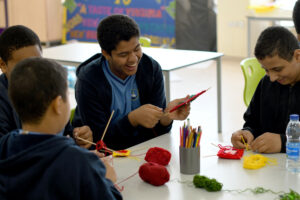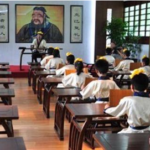Lesley Bartlett, Professor at the Department of Educational Policy Studies, University of Wisconsin-Madison, United States.

Image: Atikah Akhtar
The article “Anthropology of Education: an introduction”, published at Educação & Realidade (vol. 45, no. 2), presents the idea that Anthropology of Education is rooted in anthropology’s commitments to holism, the culture concept, cultural relativism, the value of cross-cultural comparison, and social theory. First, holism signals the effort to consider humans across time as well as the refusal to compartmentalize contemporary experiences. The commitment to holism leads anthropologists to draw on social theory from a range of disciplines, including sociology, religious studies, philosophy, politics, and economics.
Second, the concept of culture emphasizes what anthropologist Clifford Geertz (1973) famously called the webs of significance in which humans are suspended. Anthropologists have debated this concept (ERICKSON, 2011; ANDERSON-LEVITT, 2012), moving from a static notion to a more emergent conceptualization, captured in the phrase cultural production. In short, culture is something people do, rather than something people have. Further, anthropologists have also emphasized that meaning should not be divorced from structures of inequality and questions of power differentials.
Third, cultural relativism indicates an effort to understand a culture or group on its own terms, rather than using the standards of one’s own culture or beliefs. As Faulstich Orellana (2020, p. 1) notes, “Ethnography, with all its limitations — made evident in its formation through the initial colonialist encounters of the Western and non-Western world — has as its strongest impulse the quest to see and understand ‘others’ on their own terms and to step out of our own viewpoints in order to do so”. Indeed, comparison of one’s own perspectives and beliefs with those of others is fundamental to the anthropological endeavor, and it contributes to the effort to identify how particular groups of people meet universal needs.
Fourth, anthropology recognizes the role of social theory “[…] as a precursor, medium, and outcome of ethnographic study and writing” (WILLIS; TRONDMAN, 2002, p. 396). Social theory prompts topics of research and provides the conceptual framework that guides studies; the evidence of the study is used to refine social theory, making theoretical contributions the outcome of such studies. Rather than aim for the statistical generalization of quantitative research, anthropological studies generate social theories that can be transferred to other places and times.
Anthropology of education also adopts from anthropology its commitment to ethnographic methods, which include long-term engagement; participant observation of humans in natural settings; formal and informal interviewing of various sorts; and an effort to use, whenever possible, the language(s) and linguistic varieties of participants. Ethnography, as Pierre Bourdieu explained, produces “[…] a corporeal knowledge that provides a practical comprehension of the world quite different from the act of conscious decoding that is normally designated by the idea of comprehension” (BOURDIEU, 1999, p. 135).
The anthropology of education dedicates itself to the study of education, including schooling, but also the broader ways of educating found in homes, workplaces, and, indeed, all social interactions. By using the fundamental commitments of ethnography, and by studying education broadly conceived, the anthropology of education offers important insights to the field of education. The approach offers a corrective to existing theory, showing the limitations of grand generalizations. At the same time, careful attention to people’s practices and sense-making generates theoretical insights that can be transferred to other situations. The field cautions us against relying too heavily on data produced from a single self-report, like a survey or a single interview, or in abnormal circumstances, like an experiment. Anthropology of education insists that the meanings people make of their own experiences are consequential and should not be ignored. In these ways, and others, anthropological studies make important contributions to the field of education.
Do not miss the video by Lesley Bartlett describing the contributions of the thematic section on Anthropology of Education.
References
ANDERSON-LEVITT, K. M. Complicating the concept of culture. Comparative Education [online]. 2012, vol. 48, no. 4, pp. 441-454, 2012, e-ISSN: 1360-0486 [viewed 3 October 2020]. DOI: 10.1080/03050068.2011.634285. Available from: https://www.tandfonline.com/doi/abs/10.1080/03050068.2011.634285
BOURDIEU, P. Pascalian meditations. Cambridge, UK: Polity, 1999.
ERICKSON, F. Culture. In: LEVINSON, B. and POLLOCK, M. (ed.). A companion to the anthropology of education. Malden: Blackwell Publishing, 2011.
FAULSTICH ORELLANA, M. Mindful ethnography: mind, heart, and activity for transformative social research. New York: Routledge, 2020.
GEERTZ, C. The interpretation of cultures. New York: Basic Books, 1973.
WILLIS, P. and TRONDMAN, M. Manifesto for ethnography. Ethnography [online], 2000, vol. 1, no. 1, pp. 5-16, 2000, e-ISSN: 1741-2714 [viewed 3 October 2020]. Available from: https://www.jstor.org/stable/24047726?seq=1
To read the article, access
BARTLETT, L. and TRIANA, C. Anthropology of education: an introduction. Educ. Real. [online]. 2020, vol. 45, no. 2, e99887. ISSN: 2175-6236 [viewed 3 October 2020]. DOI: 10.1590/2175-623699887. Available from: http://ref.scielo.org/gqwzz8
External links
Educação & Realidade – EDREAL: www.scielo.br/edreal
http://www.ufrgs.br/edu_realidade/
About the author

Lesley Bartlett is a professor in the Department of Educational Policy Studies at the University of Wisconsin-Madison, United States. She currently co-edits the Anthropology and Education Quarterly with her colleague, Professor Stacey Lee and is associate editor of Educação & Realidade. E-mail: lesley.bartlett@wisc.edu
Como citar este post [ISO 690/2010]:


















Recent Comments